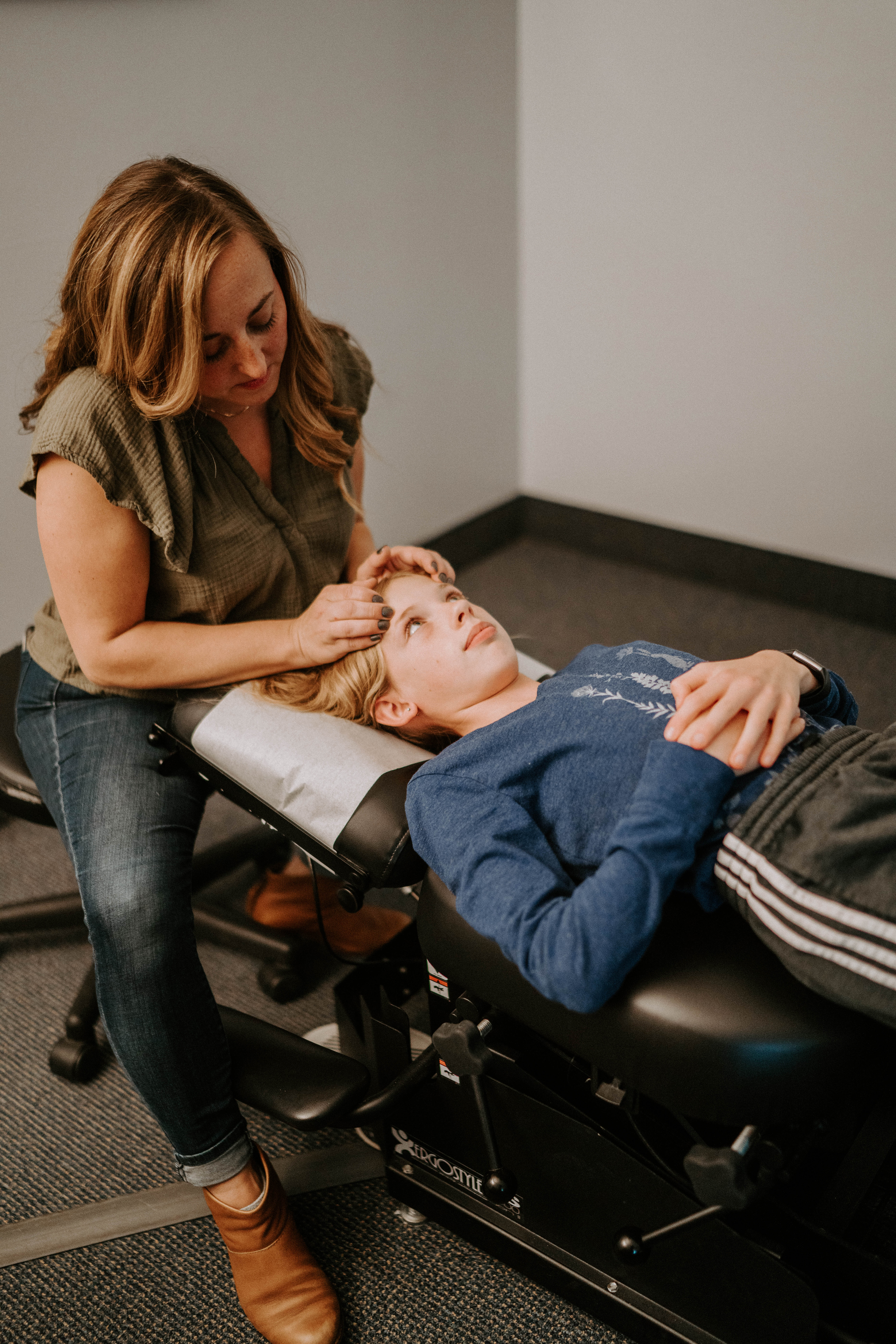WElcome TO
Explore our blog that focuses on holistic care for any and all ages - pediatric well-being, pre/post-natal health, and adult vitality.
THE BLOG

Raising healthy, happy kids in today’s fast-paced world is no small feat. From growth spurts to seasonal sniffles, our little ones face a constant stream of challenges that can sometimes leave us feeling overwhelmed. But, there’s a secret weapon in your parenting arsenal that could help your child navigate these challenges more smoothly. Enter boost adjustments! The game-changer in chiropractic care that you might not know about yet, but that could transform your family’s approach to health and wellness!
As family chiropractors, one of the most important things we discuss in our practice is knowing when it’s the right time to utilize boost adjustments for your kids, yourself, or the whole family. These extra adjustments are designed to provide additional support during those extra busy or stressful seasons of life. They’re like a turbo boost for the nervous system. Helping it adapt and thrive in the face of life’s many challenges.
Understanding Boost Adjustments
Before we dive into the specifics, let’s take a moment to understand what boost adjustments really are. In essence, they’re additional chiropractic adjustments that go beyond your regular care plan. They’re strategically timed to provide extra support when your body needs it most. They help the body process and adapt to new challenges more effectively. Whether that’s fighting off a cold, dealing with a growth spurt, or managing the stress of a new school year.
The Top 10 Reasons for Boost Adjustments
Now, let’s break down the top 10 reasons why you or your child might benefit from a boost adjustment:
- Immune Challenges: When fighting off a cold or infection, boost adjustments can optimize their neuro-immune system, helping you recover faster. Did you know children experience an average of 6-8 colds per year? That’s a lot for their little bodies to handle! Boost adjustments can give their immune system the extra support it needs to fight off those pesky bugs more effectively.
- Growth Spurts: Kids grow about 2 inches and gain about 6 pounds annually on average. These rapid periods of growth can stress the neurospinal system, sometimes leading to growing pains or temporary clumsiness. Boost adjustments help the body adapt more smoothly to these changes. Potentially easing discomfort and improving coordination during these crucial phases of development.
- Teething: We all know how disruptive teething can be! This process can affect sleep and mood by disrupting the nervous system. Extra adjustments can help balance the system during this time. Potentially leading to better sleep for your little one (and for you!), improved mood, and a smoother teething experience overall.
- Injuries and Falls: Kids are active, and accidents happen. Whether it’s a tumble on the playground or a sports-related injury, boost adjustments can aid in recovery and prevent long-term issues. They help ensure that the body heals properly and that compensatory patterns don’t develop, which could lead to problems down the road.
- Seasonal Changes: Weather shifts can throw off the nervous system, especially in sensitive individuals. Proactive adjustments can help maintain balance during these transitions. Potentially reducing the frequency of seasonal sniffles and supporting more stable moods.
- Busy School Seasons: The stress of school, sports, and activities can overwhelm the nervous system. Regular boost adjustments can improve resilience during these hectic times. Helping your child manage stress more effectively and maintain their energy levels.
- Work Stress for Adults: Yes, boost adjustments are great for parents too! They can help you perform better at work and maintain that all-important work-life balance. When you’re at your best, you’re better equipped to support your family’s health and happiness.
- Big Life Changes: Major life events like moving homes, changing schools, or welcoming a new sibling can cause emotional stress for the whole family. Boost adjustments help regulate the nervous system during these times of transition. Potentially easing anxiety and supporting smoother adaptations to new circumstances.
- Medical Interventions: If your child needs medication or vaccinations, boost adjustments can help minimize side effects and support overall health. They can help the body process and integrate medical interventions more effectively, potentially reducing adverse reactions and supporting the treatment’s efficacy.
- Starting New Therapies: When beginning new treatments or protocols, boost adjustments can help the body integrate these changes more effectively. This can lead to better outcomes and a smoother adjustment period.
The Science Behind Boost Adjustments
Now, you might be wondering, “How do boost adjustments actually work?” Great question! Each of these situations is likely to cause extra stress on the nervous system, potentially throwing health and quality of life off track. For patients already under regular chiropractic care, often all they need to get back on track quickly is to come in for a boost adjustment or two.
By providing additional adjustments that help quickly optimize nervous system function, we’re not just treating symptoms – we’re enhancing the body’s ability to heal and regulate itself. This builds resilience and adaptability, setting your child up for long-term health success.
The nervous system is the master control system of the body. It governs everything from immune function to mood regulation, from physical coordination to stress response. When the nervous system is functioning optimally, the body is better equipped to handle whatever challenges come its way.
Unlike medications that may suppress symptoms temporarily, boost adjustments aim to leave the body stronger and more resilient in the long run. It’s about empowering your child’s body to handle life’s challenges more effectively.
Making Boost Adjustments Part of Your Family’s Wellness Routine
If you’ve never scheduled a boost adjustment before, don’t worry – it’s easy! You can:
- Talk to your doctor or care advocate at your next appointment and book it on the spot
- Use our scheduling app on your phone to book a boost adjustment appointment
- Give us a call or send us a text to set up your boost adjustment
We know that life is unpredictable, and that’s okay! We’re here to support you and your family’s health journey every step of the way. Whether you plan ahead or need a last-minute appointment.
Don’t let busyness or illness slow your family down. By incorporating boost adjustments into your wellness routine, you’re investing in your ability to stay healthy and strong all year long. It’s not about treating problems as they arise – it’s about building a foundation for lifelong health and resilience.

Are you at your wit’s end dealing with your child’s constant tantrums, meltdowns, and emotional outbursts? Do you find yourself tiptoeing through each day, never knowing what might trigger the next explosion? If you’re nodding your head, take a deep breath – you’re not alone in this struggle. In fact, according to Johns Hopkins, one in five children have a diagnosis where they struggle mentally, emotionally, or behaviorally. That’s a staggering number, and it doesn’t even account for the many families silently struggling without a formal diagnosis.
The weight of these challenges can feel crushing. You’ve likely tried everything – from reward charts to time-outs, from parenting books to endless Google searches. Maybe you’ve even consulted with numerous professionals, hoping for a solution. But what if we told you that these challenging behaviors often stem from an imbalance in your child’s nervous system? And that there is a way to address these issues without relying on medication. We’re going to explore an approach that could be the missing key to your child’s behavioral challenges: neurologically-focused pediatric chiropractic care.
A Story of Hope: Jake’s Journey
To show the potential of this approach, here is a story about Jake. At just 2.5 years old, Jake transformed from a sweet and smiling little boy into a child plagued by frequent tantrums, crying spells, and explosive angry reactions. When triggered, his anger would escalate quickly. He would yell, stomp, call himself stupid, and at times even hit himself.
Jake’s family tried everything. They had numerous conversations with their pediatrician, attended weekly sessions with a child therapist, held meetings with school teachers and social workers, and participated in 504 meetings. Despite their best efforts, they felt a growing sense of desperation and heaviness in their home.
After an extremely explosive event at a martial arts competition, Jake’s family knew they needed a completely different approach. They decided to try neurologically-focused chiropractic care. With consistency and time, we worked to regulate Jake’s nervous system. The results were nothing short of remarkable.
After about 3-4 months, Jake’s parents began to notice significant changes. He appeared calmer and began to use words to express his feelings instead of lashing out. He became less anxious, less combative, and less intense. His smile returned, and he started joking around with his family again.
While Jake still has moments of frustration, he’s learned to recognize when he’s feeling heightened and apply calming strategies. His nervous system is now communicating effectively with the rest of his body, allowing him to regulate his emotions better.
Understanding the Root Cause: Beyond Behavior Modification
Jake’s story is not unique. Many children struggle with similar issues, and parents often find themselves trapped in a cycle of traditional behavior modification approaches that produce limited results. So why does neurologically-focused chiropractic care work when other methods often fall short?
Traditional approaches typically focus on managing symptoms or altering behavior through rewards and punishments. Behavior specialists often speak about learned behaviors or skill deficits, working hard to alter the external environment to support the child and teach them new skills. But what happens when the environment is already full of modifications, and all sorts of parenting strategies and professional help fail to get results?
This is where our approach differs. Instead of focusing solely on external behaviors, we look deeper to find the root cause of why a child is reacting this way. Often, it comes down to two crucial factors: sensory overload and nervous system dysregulation.
The Science Behind the Struggle
To understand this better, let’s dive into the science:
- Sensory Overload: Sensory overload is when your child’s brain is overwhelmed by excessive sensory stimuli, leading to a state of constant “noise” and confusion. This disrupts the normal regulation of the nervous system, particularly affecting the balance between the sympathetic (“fight or flight”) and parasympathetic (“rest and digest”) responses.
- Nervous System Dysregulation: When the nervous system is constantly bombarded with sensory input it can’t process effectively, it becomes dysregulated. Your child’s brain struggles to cope with the sensory chaos, leading to increased anxiety, irritability, difficulty concentrating, and those dreaded emotional meltdowns.
- The Role of Subluxation: Here’s where chiropractic care comes in. Subluxation is a misalignment or dysfunction in the spine that can interfere with the nervous system’s ability to process sensory information effectively. By addressing these subluxations, we can help clear the path for better nervous system function.
- The Vicious Cycle: Sensory overload leads to nervous system dysregulation, which is often exacerbated by subluxation.
Breaking the Cycle: How Neurologically-Focused Chiropractic Care Helps
By addressing these root causes, we aim to restore nervous system balance. This approach can:
- Reduce sensory overload by improving the brain’s ability to process and integrate sensory information.
- Improve nervous system regulation, helping your child transition more smoothly between “fight or flight” and “rest and digest” states.
- Address subluxation to enhance overall nervous system function.
- Alleviate associated behavioral issues by creating a more balanced internal environment.
The result? Better overall functioning for your child, fewer meltdowns, improved emotional regulation, and a more peaceful home environment for your entire family.
There is hope. Your child’s challenging behaviors are not simply a reflection of your parenting skills. They’re not something your child is doing on purpose or can simply “grow out of.” More often than not, they’re a sign that your child’s nervous system needs support. Just like Jake’s story, your family’s story can have a positive turning point with the right approach and support.
So, if you’re tired of feeling helpless in the face of your child’s struggles, if you’re exhausted from trying every behavioral strategy in the book with little success, it might be time to consider neurologically-focused pediatric chiropractic care. By focusing on balancing the nervous system, we can help create a foundation for better behavior, improved emotional regulation, and overall well-being.
Let’s work together to restore balance to your child’s nervous system. The journey might not always be easy, but with patience, consistency, and the right support, remarkable changes are possible.

Infantile colic is a condition that can be both frustrating and controversial for parents. Many conventional pediatricians mistakenly state that “some babies just get colic” and “don’t worry, they’ll grow out of it.” However, there is ongoing debate about the root causes of colic and how babies develop this condition. In this blog post, we’ll break down the science behind colic, keep it simple, and discuss safe and natural ways to help ease your little one’s constant crying and discomfort.
If your baby is struggling with colic and you’re desperate for answers and relief from the constant crying and sleepless nights, this is for you! If your gut is telling you that it’s not normal that your baby is constantly crying, uncomfortable, arching their back, and cranking their neck to try and find some relief – keep reading.
We are going to reveal how overall neurological function can resolve many of your child’s health struggles! Learn gentle ways to stimulate the nervous system, plus specialized chiropractic care to detect and address vagus nerve dysfunction without drugs or surgery.
The Most Overlooked Trigger of Colic
One of the most overlooked yet obvious initial triggers of colic is an overstressed and subluxated nervous system. We often find that the vast majority of colic patients have at least one of the following stressors in their case history:
- A high-stress or high-risk pregnancy
- Birth interventions such as forceps, vacuum extraction, induction, epidural, or c-section that can physically injure and alter the function of the nerves and muscles of the upper neck
These interventions can impact various functions, including sleeping, latching, breastfeeding, swallowing, digestion, and gross motor development, like turning the head and tummy time. These common initial stressors can cause the infant’s nervous system to become highly sensitive and stuck in a sympathetic fight or flight mode.
Jackson’s Story of Hope
Consider the story of baby Jackson, who struggled with bad reflux, gas pains, and trouble sleeping at night as an infant. Jackson’s mom shared, “It was very difficult for us to try and navigate being first-time parents and having Jackson struggling with these issues! It was hard to see Jackson so upset and unhappy because he was always so uncomfortable.”
Jackson’s mom reported, “Jackson started getting adjusted when he was 9 weeks old, and within the first couple of weeks, we definitely started to see changes! We first noticed that he was no longer having constant gas pains and didn’t seem as uncomfortable anymore. Within the first month, his colic seemed to disappear, and we started to see Jackson’s happy and silly personality coming through.”
With continued care, Jackson transformed into “a completely different baby” compared to when he first started treatment. His colic and stomach pains were completely gone, his reflux had improved, and he was even sleeping through the night! Now, as a toddler, Jackson’s mom says, “He is truly the happiest and is always smiling and laughing. We could not be more thankful to have found our pediatric chiropractor – they’ve taught us so much about chiropractic care and the benefits it could provide to Jackson. Thank you for giving us our happy boy back!”
Sympathetic Dominance and Its Effects
When an infant’s nervous system is stuck in a sympathetic fight or flight mode, they may struggle with basic health functions such as sleeping, eating, pooping, and moving. Parents often innately know that something within their little one’s body is not working well, including both “internal” muscles that control digestion and “external” muscles of the neck and spine. This is why infants with colic often struggle more after eating and are constantly arching their neck and back.
Many parents of colicky infants have already tried removing dairy and other common foods that have a higher risk of allergies and intolerances. Some families have also had their children’s tongue or oral ties surgically revised and clipped. While tongue and oral ties can cause trouble with latching, nursing, and discomfort, it’s essential to look deeper at the root cause of these issues. If a child’s nervous system is stuck in a sympathetic fight or flight mode, it can leave all the muscles and ligaments of the body extra wound tight and tense. Even if the tongue and oral ties are surgically revised, the tension may remain in the nervous system and other important parts of the body.
Finding the Real Root Cause
While most people look to the stomach or digestive system for the root cause of colic, it’s often found even deeper within the nervous system and its control and coordination of digestive motility, absorption, and elimination. When tension and subluxation build up along the neurospinal system, a colicky baby will often arch their back and crane their neck, trying to release or dissipate that tension themselves. This is an almost sure sign that the root cause of their discomfort is neurospinal discomfort and tension, not merely digestive dysfunction.
Neurologically-focused chiropractic care is a gentle, non-invasive approach that can help address the underlying neurological factors contributing to colic. We are specifically trained to identify and correct subluxations (misalignments) in the spine that can interfere with proper nervous system function. By restoring balance to the nervous system, chiropractic care can help relieve symptoms of colic and promote overall health and well-being in infants.
At RCW, our doctors use a combination of thorough assessments and advanced technology called Neurological INSiGHT Scans to detect and measure the presence of subluxation and neurological dysfunction or sympathetic dominance in colicky infants. This targeted approach allows us to develop personalized care plans that address each child’s unique needs.
Benefits of Neurologically-Focused Chiropractic Care for Colic
In addition to helping alleviate the symptoms of colic, chiropractic care can offer a range of other benefits for infants and children. These may include:
- Improved sleep quality and duration
- Enhanced immune system function
- Better digestion and reduced digestive discomfort
- Increased range of motion and flexibility
- Support for healthy brain and nervous system development
It’s important to note that chiropractic care is not a “one-size-fits-all” solution, and results may vary from child to child. However, many parents have reported significant improvements in their babies’ comfort, happiness, and overall well-being following chiropractic care.
So, if you’re ready to find real answers and drug-free solutions for your baby’s colic, consider scheduling an initial consultation with one of our docs. With the right approach, you can help your little one find the peace, comfort, and restful sleep you both desperately need. Don’t spend another exhausting night wondering if there’s hope – take action and seek the support your family deserves.
By addressing the root cause of colic through gentle, Neurologically-Focused Chiropractic Care, you can help your baby thrive and enjoy a happier, healthier childhood.






